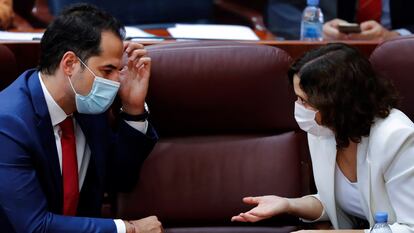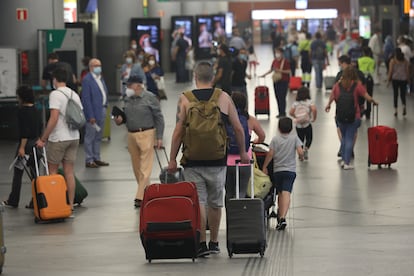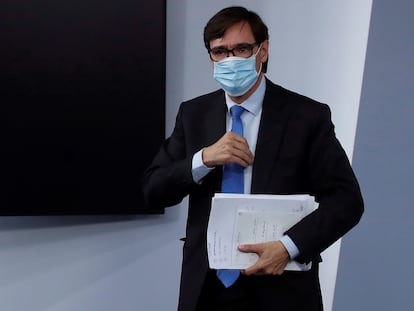New coronavirus restrictions in Madrid will be implemented tonight despite regional court appeal
The Popular Party premier Isabel Díaz Ayuso has resorted to legal action against the central government’s measures without the backing of her coalition partner Ciudadanos


The Madrid regional government today filed an appeal at Spain’s High Court, the Audiencia Nacional, against the measures that the Health Ministry has introduced across Spain in a bid to halt the spread of the coronavirus. The Madrid premier, Isabel Díaz Ayuso of the conservative Popular Party (PP), has opted for legal action that includes an injunction that could suspend the new restrictions within the next 10 days, despite them having been voted for by a majority of Spain’s regions on Wednesday. The restrictions are due to be applied from 10pm on Friday in municipalities of more than 100,000 residents where certain requisites are met.
As it did during the first wave, Madrid has once again become the epicenter of the coronavirus crisis in Spain, and according to the latest Health Ministry data, currently accounts for 35% of new cases despite having just 14% of the country’s population. In recent weeks the regional government – which is run by the PP in coalition with center-right Ciudadanos, propped up by far-right Vox – has been engaged in a battle with the central government, which wants to see greater restrictions in the region in a bid to curb the spread of the coronavirus. Throughout the crisis, Ayuso has been highly critical of the handling of the situation by the government, which is run by the Socialist Party (PSOE) in coalition with junior partner Unidas Podemos, and tensions have been running especially high between the two administrations in recent weeks.
The regional government did not request that its appeal filed with the High Court be treated with urgency, meaning that the new restrictions should come into force in Madrid late on Friday night. The measures will be published in the region’s official gazette, the BOCM, but they will have to be ratified by the Madrid High Court given that they relate to limitations on the fundamental right of freedom of movement. This means in effect that Madrileños will still be able to move around the region freely until this court rules on the restrictions.
Speaking at a press conference on Friday afternoon, the Madrid regional health chief, Enrique Ruiz Escudro, confirmed that the measures would be implemented at 10pm on Friday night.
The appeal filed by the Madrid government claims that the Health Ministry’s measures constitute an “encroachment of its powers,” and that they involve a “limitation” of fundamental rights. The appeal ignores the fact, however, that the regional government itself has already implemented the same measures in 45 basic healthcare areas in the Spanish capital and surrounding areas.
Deputy premier left in the cold
The decision to appeal the central government’s new measures, according to sources from the Madrid administration, was taken by Ayuso without consulting with Ciudadanos nor her ministers. What’s more, the move became known publicly while the deputy premier, Ignacio Aguado of Ciudadanos, was being interviewed on state broadcaster TVE. This is the second time in a week that Aguado has been left in the cold by the PP premier, after the politician struck the deal with the Health Ministry to implement new restrictions in the region only for them to be publicly rejected on Wednesday by Ayuso.
When the news broke, the journalist interviewing Aguado asked him: “Is this a mistake?” “It’s the premier’s decision and she obviously has the last word,” he replied. Sources from Ciudadanos later explained that the party was against the move. “I support dialogue, not resorting to the courts,” Aguado added during last night’s interview.
The coronavirus measures were published by the central government in the Official State Gazette (BOE) on Thursday, and for now only municipalities in the Madrid region meet the criteria for them to be implemented. They include, among other measures, a perimetral lockdown, with a handful of exceptions such as going to work or the doctor, among others. The capital city is due to be affected, as well as Parla, Fuenlabrada, Alcobendas, Torrejón de Ardoz, Getafe, Alcorcón, Leganés, Móstoles and Alcalá de Henares, all of which are cities in the region.
There is still ongoing uncertainty as to how exactly the measures will work – in particular in the capital, which, with Barajas airport and Atocha and Chamartín train stations, is a major transport hub for the rest of the country.

Isolating a city such as the Spanish capital will be practically impossible to manage. There are more than 2.2 million journeys a day between the city and the rest of the region’s municipalities, according to a 2018 survey. Many of these trips will be justified under the new rules given that 40% of journeys in the region are for work or education purposes.
What’s more, some epidemiologists point out that the efficiency of the measures will not depend so much on mobility restrictions, but rather the tracking and tracing of contacts after an infection is detected, and the isolation of people who have been confirmed to have the coronavirus. “It’s easier to confine small municipalities than a big city,” said Joan Ramon Villalbí, a director from the Spanish Society for Public Health and Health Administration (Sespas). “But there are examples of limitations in the neighborhoods of big cities that have worked, such as in L’Hospitalet,” he added, in reference to a Barcelona municipality.
There are also doubts about tourism and foreign visitors. In principle, under the new rules, a tourist would not be able to enter Madrid. But a visitor from abroad cannot be denied entry into the country by a region, given that Spain has not yet closed its borders nor has it notified other countries of any new restrictions on travel. Questioned about this issue, a number of Spanish ministries have responded with silence.
Based on reporting by Manuel Viejo, Hugo Gutiérrez, Fernando Peinado, Luis de Vega, Pablo Linde and Jesús García.
English version by Simon Hunter.









































